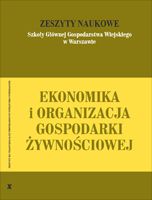Main Article Content
Article Details
Broszura informacyjna Przedstawicielstwa Komisji Europejskiej w Polsce "Polityka społeczna Unii Europejskiej", kwiecień 2003.
Polskie Forum Strategii Lizbońskiej. Biała Księga 2003. Część IV. Nowy Model Społeczny, I. Białecki, Z. Czepulis-Rutkowska, U. Sztanderska, I. Wójcicka, Gdańsk - Warszawa 2003.
Statistik kurz gefasst. Bevölkerung und soziale Bedingungen. Armut und soziale Ausgrenzung in der EU nach Laeken Teil 1, THEMA 3 - 8/2003, Eurostat 2003.
Statistik kurz gefasst. Bevölkerung und soziale Bedingungen. Dauernde Einkommensarmut und soziale Ausgrenzung in der Europäischen Union, 13/2000, Eurostat 2000.
The social situation in the European Union 2002, Office for Official Publications of the European Communities, Luxembourg 2002.
Downloads
- Marcin Idzik, Aneta Stańko, Ekonomiczne uwarunkowania oraz tendencje zachowań konsumentów na rynku dóbr FMCG , Zeszyty Naukowe SGGW - Ekonomika i Organizacja Gospodarki Żywnościowej: Nr 59 (2006)
- Maria Zajączkowska, Aneta Stańko, Sfera ubóstwa w Polsce w latach 1994-2000 , Zeszyty Naukowe SGGW - Ekonomika i Organizacja Gospodarki Żywnościowej: Nr 46 (2002)
- Maria Zajączkowska, Aneta Stańko, Przemiany w sferze ubóstwa w Niemczech , Zeszyty Naukowe SGGW - Ekonomika i Organizacja Gospodarki Żywnościowej: Nr 47 (2002)
- Aneta Stańko, Przedsiębiorczość jako czynnik rozwoju obszarów wiejskich , Zeszyty Naukowe SGGW - Ekonomika i Organizacja Gospodarki Żywnościowej: Nr 79 (2009)
- Aneta Stańko, Wykluczenie społeczne z rynku pracy w krajach Unii Europejskiej , Zeszyty Naukowe SGGW - Ekonomika i Organizacja Gospodarki Żywnościowej: Nr 72 (2008)
- Aneta Stańko, Poziom wydatków na edukację w krajach członkowskich Unii Europejskiej , Zeszyty Naukowe SGGW - Ekonomika i Organizacja Gospodarki Żywnościowej: Nr 73 (2009)
- Aneta Stańko, Poziom ubóstwa w krajach nowo przyjętych do Unii Europejskiej , Zeszyty Naukowe SGGW - Ekonomika i Organizacja Gospodarki Żywnościowej: Nr 53 (2004)
- Aneta Stańko, Agnieszka Sokół, Wpływ bezrobocia na ubóstwo mieszkańców gmin Legionowo i Nieporęt , Zeszyty Naukowe SGGW - Ekonomika i Organizacja Gospodarki Żywnościowej: Nr 63 (2007)





